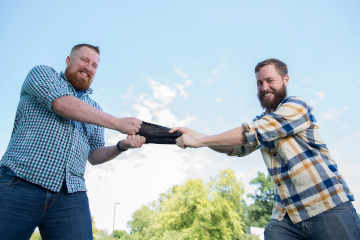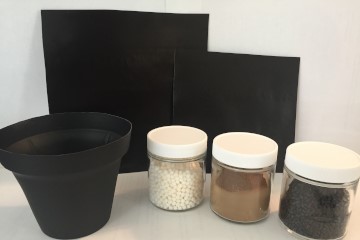Beginnings & Vision
Tony Bova and Jeff Beegle, founders of mobius, have the vision “to build a future where organic waste is not seen as a burden on society or the planet, but instead as a valuable resource.” The inspiration for mobius originates from a pitch competition they participated in at the University of Toledo in 2013. Jeff recalls, “We saw entrepreneurship as an opportunity to bring new technologies out of an academic laboratory and into the real world”. As a result of their similar background and interest in converting waste into renewable chemicals and energy, Tony and Jeff founded mobius in 2016 while pursuing their graduate degrees at the University of Tennessee-Knoxville. Since then, the mobius team has expanded to include three additional employees: Danielle Cowan-Banker, Mackenzie Hodge, and Dr. Patrick Caveney, with Tony serving as CEO and Jeff as Chief Science Officer.
Wonderful Waste
mobius’s mission is to “Create a world where There’s Wonder in Waste”. Indeed, lignin is the second most abundant natural biopolymer in the world and the natural glue that holds trees and plants together, but it is also the primary waste product of biorefineries and paper mills. Over 100 million tons are produced every year. The vast majority is landfilled or burned for low-value energy. Conversely, mobius’s process, developed by Tony during his PhD, uses this source material to produce a pelletized resin, the currency of the plastic industry, which can be converted into biodegradable and compostable plastic products. Currently, the company is focused on partnering with manufacturers of products in the agricultural and horticultural industry, such as flower pots and seed coatings. The applications of their technology can be extended into a variety of industries beyond agriculture and horticulture, as their process can be tuned for specific material compositions, mechanical properties, and degradation characteristics.
Contributing to the Sustainable Development Goals
The transition to a circular economy and the protection of the global climate require significant restructuring in the use of plastic materials. With its solvent-free and zero-waste process, mobius contributes to the achievement of the SDGs, particularly Goals 12-15. By using waste feedstocks for the creation of valuable industrial materials, mobius can contribute to responsible production in a circular economy. mobius’ products also have a positive impact on greenhouse gas emissions by replacing petroleum-based materials. Finally, mobius minimises plastic pollution in marine and land environments by reducing single-use plastic consumption.
Striving Forward
The relationship between the ISC3 and mobius began when the company participated in an ACHEMA booth co-hosted by the ISC3 and American accelerator programme Think Beyond Plastic in May 2018, showcasing their innovative approach. mobius officially on-boarded into the ISC3’s Global Start-Up Service in December 2018, participating in the Investor Forum organized by the ISC3, Think Beyond Plastic, and the Ellen MacArthur Foundation that same month. Since then, mobius has been receiving valuable networking information and was given access to the ISC3 Changemakers group, an online community for the Global Start-Up Service innovators.
“We’ve had an incredible experience starting this company, from international pitch competitions to winning grants and talking to investors, we’ve explored several resources to help grow”, says Jeff. mobius plans launching its first paid pilots with companies in the US and EU and further growing its team as the company’s next steps. The future vision for mobius is to build the world’s first distributed waste refinery. This involves creating technologies to convert the four material streams found in all organic waste (lignin, fats, sugar and fibers, and protein) and upcycling them into valuable chemical and material building blocks for the circular economy.
You can also watch our interview with Tony at the 2018 ACHEMA trade fair here



